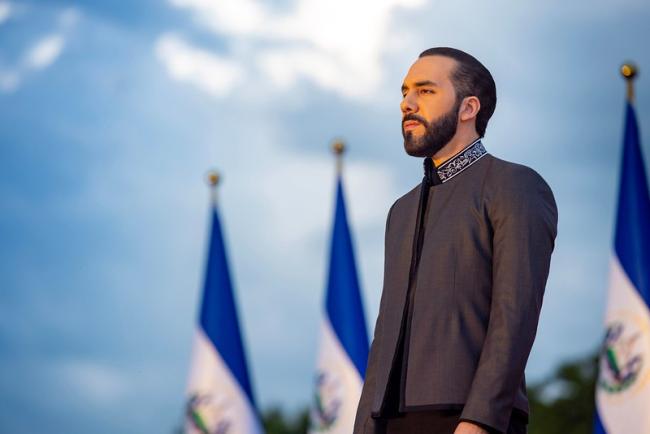by ISABEL RIKKERS & NOELLE BRIGDE

President Nayib Bukele’s framing of security as a spiritual battle between good and evil helps to explain his popularity and his support for Israel.
On October 8 of last year, Salvadoran President Nayib Bukele published a post on X outlining his position on Palestine. “As a Salvadoran of Palestinian ancestry, I’m sure the best thing that could happen to the Palestinian people is for Hamas to completely disappear. Those savage beasts do not represent the Palestinians,” he wrote. Drawing parallels between Hamas and gangs in El Salvador, Bukele continued: “It would be like if Salvadorans would have sided with MS13 terrorists, just because we share ancestors or nationality. The best thing that happened to us as a nation was to get rid of those rapists and murderers and let the good people thrive.” Bukele closed his post with a word of advice, drawing from his nearly 30-month long—and counting—assault against gangs. “Palestinians should do the same: get rid of those animals and let the good people thrive.”
The parallel drawn by Bukele between Hamas and MS13 derives from an evangelical Christian understanding of “terrorist” security threats as a spiritual contest between good and evil. Bukele uses biblical allegories, religious narratives, declarations of devotion, and visual propaganda leveraging sacred symbols to justify the country’s security policies, in addition to asserting the Salvadoran government’s unwavering support for Israel during its genocide of Palestinians.
Security Theology
According to Bukele’s formulation, the great battle for the soul of nations demands a cleansing of uncivilized individuals living among otherwise good people.Since first declaring a state of emergency in March 2022, the Bukele regime’s hardline against gangs remains popular and most Salvadorans perceive an increase in public safety, despite a deepening record of political repression, authoritarianism, arbitrary detentions, the suspension of constitutional rights, and widespread human rights abuses—including 265 deaths in state custody and torture in prisons. El Salvador now has the highest incarceration rate in the world. According to Bukele’s formulation, the great battle for the soul of nations demands a cleansing of uncivilized individuals living among otherwise good people. Recycled iterations of security discourse from the Cold War through the War on Terror and the current “war on gangs” rearticulate a colonial imaginary buttressed by Christian Zionism.
To celebrate his first presidential victory in 2019, Bukele posted an Instagram photo of himself praying at the Western Wall in Jerusalem. In the photo, taken during an official visit to Israel in 2018, then-mayor Bukele wears his trademark leather jacket and closes his eyes in devotion. The image speaks to multiple, long-standing sources of Israeli influence on Salvadoran foreign policy; it explains why, after October 7, 2023, the Salvadoran government refused to criticize the Israeli genocide of Palestinians, despite the country being home to a sizeable and politically consequential population of Palestinian ancestry, including Bukele. Furthermore, the image elucidates a common ideological frame underpinning both Salvadoran and Israeli security politics. Within this frame—what Nadera Shalhoub-Kevorkian calls “security theology”—security itself becomes religion, intertwined with biblical narratives.
Christian Zionism and “Spirit-Filled Geopolitics”
In 2018, prior to becoming president, Bukele arrived in Jerusalem at the invitation of deputy foreign minister Tzipi Hotovely and Jack Rosen, the president of the American Jewish Congress, to attend an urban policy conference. At such conferences, policymakers, consultants, and tech industry representatives broker deals for security initiatives. Indeed, shortly after his election, Bukele announced a $3 million donation from the nonprofit Jerusalem Foundation for police and military medical supplies. Since assuming the presidency, Bukele has also extensively used Israeli spyware to track the activities of independent journalists, human rights defenders, and members of opposition parties.
Israeli exports to El Salvador have grown at an annual rate of 21.1 percent from 2017 to 2022, with the top products being firearms and military weapons. These connections highlight the material influence of the Israeli military-industrial complex and continuing Salvadoran security dependence on Israel, which began with the bloody military regimes of the 1970s. Israel provided 83 percent of Salvadoran military imports between 1975 and 1979, and these agreements continued throughout the Salvadoran civil war (1980-1992) with deals for napalm, arms, and military technology and training.
NACLA for more
